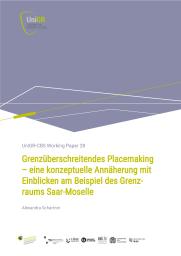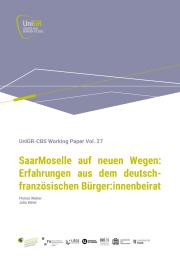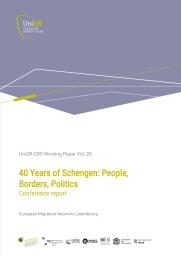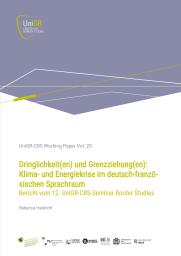Working Papers
The UniGR-CBS Working Paper series publishes the theoretical/conceptual and empirical results of border research, as well as making them accessible to the scientific community. The intention is to make the border studies more visible and to support the exchange between border researchers inside and outside the Greater Region. Please contact borderstudies@uni.lu for any publication inquiries.

Working Paper Vol. 29: Application of Dynamical Systems Theory for Cross-Border Cooperation in the Greater Region
This working paper introduces the methodology of the Dynamical Territorial Impact Assessment (DyTIA), developed through the analysis of the INTERREG programs in the Greater Region. It starts from the notion that existing impact assessments are largely static and thus fail to capture the complex, non-linear dynamics of cross-border areas. The paper is structured into seven main sections: the…
Cohesion Policycross-border cooperationInterregTerritorial Impact AssessmentDynamical System Theory
Working Paper Vol. 28: Grenzüberschreitendes Placemaking – eine konzeptuelle Annäherung mit Einblicken am Beispiel des Grenzraums Saar-Moselle
The concept of “placemaking” is well established in architectural, urban, and regional planning discourse. It refers to processes through which localities become identity-forming – through spatial design, social practices, or symbolic loading. This working paper offers a first theoretical reflection on the transferability and further development of placemaking in cross-border contexts. It…
GrenzraumPlacemakingGrenzortPrä-IBASaar-MoselleRaumproduktionGrenzforschung
Working Paper Vol. 27: SaarMoselle auf neuen Wegen: Erfahrungen aus dem deutsch-französischen Bürger:innenbeirat
As part of the “Common Ground SaarMoselle” project funded by the Robert Bosch Foundation, a cross-border citizens’ advisory council was set up in a pilot phase in the Eurodistrict SaarMoselle in 2024. The aim is to actively involve citizens from Germany and France in the development of future perspectives for the shared border region. In a one-year process, the advisory council consisting of…
Coopération transfrontalièreEurodistrict SaarMoselleParticipationconseil des citoyen
Working Paper Vol. 26: 40 Years of Schengen: People, Borders, Politics
To mark the 40th anniversary of the Schengen Agreement, the conference '40 Years of Schengen: People, Borders, Politics”, jointly organised by EMN Luxembourg and the UniGR-Center for Border Studies, of-fered a timely opportunity to celebrate European integration and critically analyse the evolving realities of border governance. Focusing on the free movement of people in border regions,…
SchengenborderEuropeFree movementMigration
Working Paper Vol. 25: Dringlichkeit(en) und Grenzziehung(en): Klima- und Energiekrise im deutsch-französischen Sprachraum. Bericht vom 12. UniGR-CBS-Seminar Border Studies
This working paper provides a synthesis of the findings of the 12th UniGR-CBS Border Studies Seminar on the concept of “urgency” in the context of the climate and energy crisis. The seminar focused on research perspectives concerning the relationship between urgency and border delineations, as explored within an interdisciplinary working space from a Franco-German perspective. A key outcome of…
Climate CrisisTransformationBoundary workBoundary workUrgencyAffectivityAnthropocene